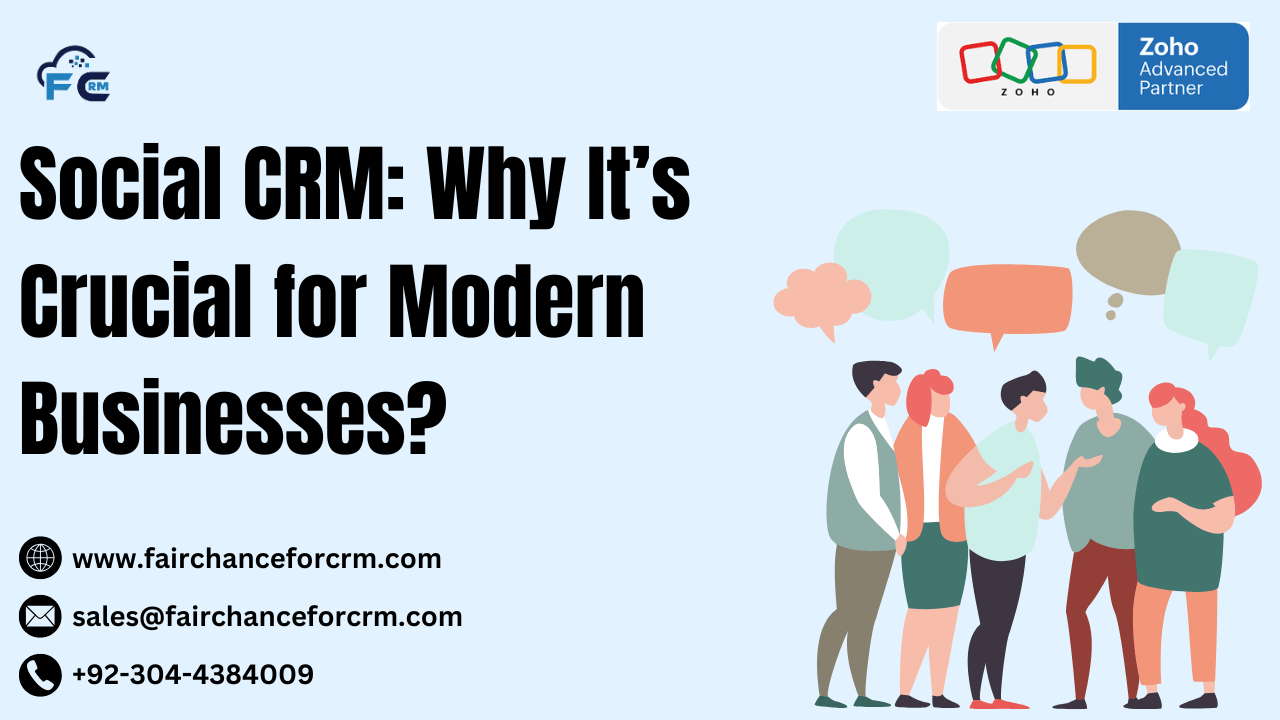Real-time conversations and feedback are now possible thanks to social media, which has completely changed how businesses interact with their clients. However, without a social CRM (Customer Relationship Management) tool, these valuable insights often remain confined to marketing teams, creating silos that hinder company-wide collaboration.
This divide is filled by a well-thought-out CRM, which unites teams around more in-depth consumer information and facilitates more productive collaboration. We’ll discuss CRM in this blog, including what it is, why companies need it, and how it may transform customer service and corporate tactics.
Also Read:
- Zoho Recruit: A Game-Changer for Streamlining Recruitment
- Zoho CRM and NetSuite Integration
- Zoho Workspace vs Google Workspace
- Zoho Books vs QuickBooks
- Zoho Commerce and its Importance
What is Social CRM?
The term “social CRM” describes how standard customer relationship management systems are integrated with social media platforms. Through the integration of data and interactions from social media sites like Facebook, Instagram, LinkedIn, and Twitter, it focuses on maintaining customer relationships.
Using CRM, businesses may improve customer service, track online activity, and learn more about the behavior of their clients. It enables smooth communication between the company and its clients and provides real-time data, providing a full picture of client engagements that extends beyond traditional contact points like phone or email.
Benefits of CRM
1) Faster Customer Support
With CRM, businesses can respond quickly to customer queries and issues, delivering a higher level of customer satisfaction. Social media platforms facilitate almost instantaneous contact, which facilitates problem-solving in real time.
2) Unified Collaboration Between Teams
CRM brings together marketing, sales, and customer service teams by providing a shared platform where everyone can access the same customer insights. By doing away with silos, this integration promotes improved teamwork and guarantees that every department is working toward providing a uniform client experience.
3) Enhanced Brand Reputation Management
CRM allows businesses to monitor mentions of their brand across various platforms, helping them stay on top of public perception. By taking proactive measures to address negative criticism and leveraging favorable remarks, companies can enhance their online brand visibility.
How Social CRM Works: Key Metrics to Track
CRM tools collect data that can offer insights into a brand’s performance and customer engagement. Here are some of the key metrics that businesses can track using a CRM system:
- Website Traffic: By analyzing social traffic, companies can measure how effective social channels are in driving visitors to their website or online store.
- Brand Mentions: Tracking brand mentions across multiple social platforms gives businesses insights into how often they’re being discussed and what the general sentiment is.
- Engagement Metrics: CRM software breaks down engagement metrics like likes, shares, comments, and reposts, helping businesses measure customer interaction levels.
Types of Social CRM Solutions
CRMs come in two main varieties:
- Built-in CRM Features: Some CRMs include built-in social media functionalities, allowing businesses to manage both traditional customer interactions and social media engagement from a single platform.
- Standalone Software: These tools are designed specifically for social media management and need to be integrated with traditional CRM systems. They provide more robust social media-specific features but require additional setup.
Social CRM vs. Traditional CRM
While traditional CRM focuses on tracking interactions through email, phone calls, and meetings, CRM expands the scope to include social media platforms. This shift allows businesses to tap into a broader range of customer data, track conversations happening in real-time, and foster more authentic and immediate engagement.
Traditional CRMs tend to focus on managing transactional interactions, whereas CRMs allow businesses to manage both transactional and conversational relationships, deepening customer loyalty and understanding.
Key Benefits of Social CRM for Businesses
1) Empowering Support Teams
CRM equips customer support teams with the tools and data they need to handle inquiries more effectively. With insights from social interactions, support agents can quickly identify and resolve customer issues.
2) Deeper Audience Understanding
CRM provides real-time data on customer behavior, preferences, and feedback, giving companies a clear understanding of what drives their target audience. This information helps businesses tailor their marketing efforts to deliver personalized experiences.
3) Social Context for Customer Interactions
By collecting social data, businesses can engage in more meaningful conversations with customers. This humanizes the brand and helps build stronger relationships with customers, as businesses can respond to social cues in real-time.
4) Instant Feedback and Adaptation
Social allows businesses to receive instant feedback from their audience, enabling them to quickly adapt their strategies and improve products or services based on customer input.
5) Expanding Brand Reach
By identifying influencers and brand advocates on social media, businesses can extend their reach and improve brand awareness. Collaborating with these individuals can significantly boost your company’s visibility.
6) Lead Generation and Nurturing
CRM simplifies the lead generation process by capturing social media data. Teams can use this data to qualify leads, target them with personalized messaging, and nurture them throughout the sales cycle.
7) Enhanced Customer Care
With integrated social data, customer service teams can provide more comprehensive support, using contextual information from a traditional CRM to resolve issues more efficiently. CRM bridges the gap between social interactions and customer support, enabling seamless issue resolution.
Best Social CRM Tools to Consider
If you’re looking to enhance your customer relationships through social media, here are some top CRM tools to consider:
1) Zoho CRM
Zoho integrates effortlessly with social media platforms and provides robust features for lead generation, customer interaction tracking, and analytics. Its built-in social features allow businesses to stay updated on customer engagements, manage social accounts, and track key social media metrics directly from the CRM.
2) Salesforce
Salesforce offers advanced CRM functionalities through tools like Social Studio and Community Cloud. With seamless integration into their Marketing Cloud, Salesforce allows businesses to leverage AI-powered insights to enhance customer interactions and marketing efforts.
Challenges of Implementing Social CRM
1) Identifying Relevant Information
With an overwhelming amount of social media data, it can be difficult to sift through and identify the most important information. Businesses must develop strategies for filtering out the noise to focus on actionable insights.
2) Translating Data into Actionable Strategies
Once you collect social media data, structuring it in a way that leads to effective customer strategies can be a challenge. Social CRM helps simplify this process by providing tools that segment and categorize data, allowing businesses to focus on relevant customer interactions.
3) Keeping Teams Adaptable
As social media trends constantly evolve, businesses must ensure their teams stay informed and adaptable. Regular training and staying updated on the latest social media tools and trends are crucial to maintaining an edge.
4) Managing Multiple Social Platforms
With the rapid rise of new social platforms, it can be difficult for businesses to stay active and engaged across all channels. Social CRM helps consolidate these efforts by providing a unified platform for managing interactions across different networks.
Conclusion
In today’s digital-first world, CRM is a vital tool for businesses looking to stay competitive and build lasting relationships with their customers. By integrating social media data into customer interactions, businesses can provide more personalized marketing, improve customer service, and enhance their brand’s reputation. Leveraging CRM ensures you stay ahead of the curve, delivering a superior customer experience while driving long-term growth.
For more information about the Social CRM, visit this link.
If you want to Free Trail Zoho, click on this link.




